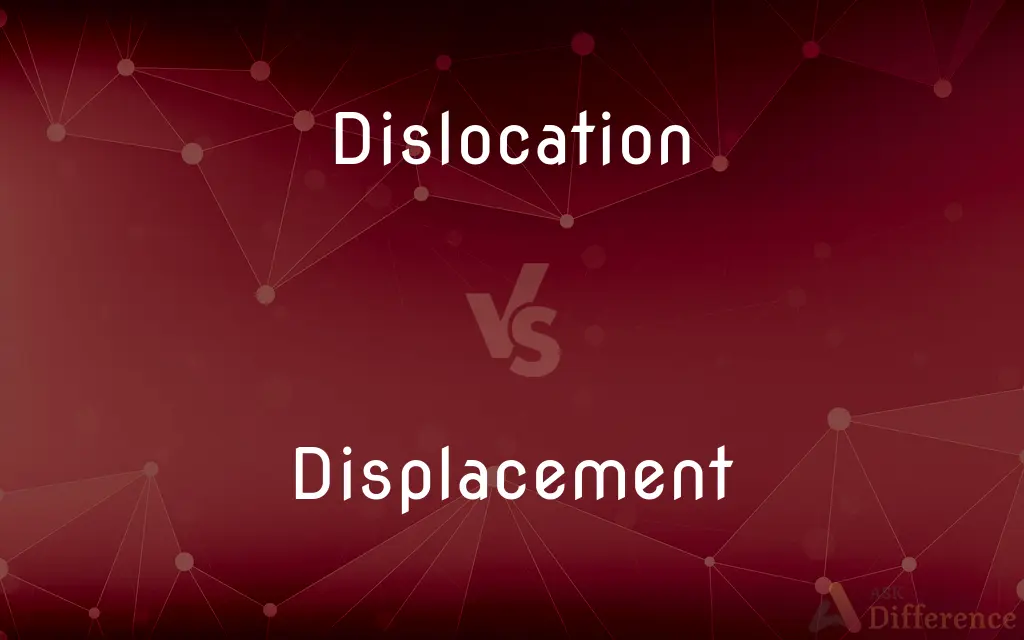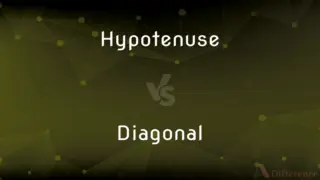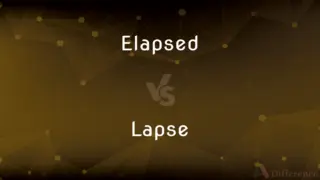Dislocation vs. Displacement — What's the Difference?

Difference Between Dislocation and Displacement
ADVERTISEMENT
Compare with Definitions
Dislocation
In materials science, a dislocation or Taylor's dislocation is a linear crystallographic defect or irregularity within a crystal structure that contains an abrupt change in the arrangement of atoms. The movement of dislocations allow atoms to slide over each other at low stress levels and is known as glide or slip.
Displacement
The act of displacing.
Dislocation
The act or process of dislocating or the state of having been dislocated
"the severe emotional dislocation experienced by millions of immigrants ... who were forced to separate themselves forever from the ... circle of people and places on which they had depended" (Doris Kearns Goodwin).
Displacement
The condition of having been displaced.
Dislocation
Displacement of a body part, especially the temporary displacement of a bone from its normal position.
ADVERTISEMENT
Displacement
(Chemistry) A reaction in which an atom, radical, ion, or molecule replaces another in a compound.
Dislocation
(Chemistry) An imperfection in the crystal structure of a metal or other solid resulting from an absence of an atom or atoms in one or more layers of a crystal.
Displacement
A vector or the magnitude of a vector from the initial position to a subsequent position assumed by a body.
Dislocation
(Geology) See displacement.
Displacement
The weight or volume of a fluid displaced by a floating body, used especially as a measurement of the weight or bulk of ships.
Dislocation
The act of displacing, or the state of being displaced.
Displacement
The volume displaced by a single stroke of a piston in an engine or pump.
Dislocation
(geology) The displacement of parts of rocks or portions of strata from the situation which they originally occupied.
Displacement
The relative movement between the two sides of a fault.
Dislocation
The act of dislocating, or putting out of joint; also, the condition of being thus displaced.
Displacement
The distance between the two sides of a fault. Also called dislocation.
Dislocation
(materials science) A linear defect in a crystal lattice. Because dislocations can shift within the crystal lattice, they tend to weaken the material, compared to a perfect crystal.
Displacement
(Psychiatry) A psychological defense mechanism in which there is an unconscious shift of emotions, affect, or desires from the original object to a more acceptable or immediate substitute.
Dislocation
(grammar) A sentence structure in which a constituent that could otherwise be either an argument or an adjunct of a clause occurs outside of and adjacent to the clause boundaries.
Displacement
The act of displacing, or the state of being displaced; a putting out of place.
Dislocation
The act of displacing, or the state of being displaced.
Displacement
The quantity of a liquid displaced by a floating body, as water by a ship, the weight of the displaced liquid being equal to that of the displacing body.
Dislocation
The displacement of parts of rocks or portions of strata from the situation which they originally occupied. Slips, faults, and the like, are dislocations.
Displacement
(chemistry) The process of extracting soluble substances from organic material and the like, whereby a quantity of saturated solvent is displaced, or removed, for another quantity of the solvent.
Dislocation
The act of dislocating, or putting out of joint; also, the condition of being thus displaced.
Displacement
(fencing) Moving the target to avoid an attack; dodging.
Dislocation
An event that results in a displacement or discontinuity
Displacement
(physics) A vector quantity which denotes distance with a directional component.
Dislocation
The act of disrupting an established order so it fails to continue;
The social dislocations resulting from government policies
His warning came after the breakdown of talks in London
Displacement
(grammar) The capability of a communication system to refer to things that are not present (that existed or will exist at another time, or that exist at another location).
Dislocation
A displacement of a part (especially a bone) from its normal position (as in the shoulder or the vertebral column)
Displacement
The act of displacing, or the state of being displaced; a putting out of place.
Unnecessary displacement of funds.
The displacement of the sun by parallax.
Displacement
The quantity of anything, as water, displaced by a floating body, as by a ship, the weight of the displaced liquid being equal to that of the displacing body.
Displacement
The process of extracting soluble substances from organic material and the like, whereby a quantity of saturated solvent is displaced, or removed, for another quantity of the solvent.
Displacement
An event in which something is displaced without rotation
Displacement
Act of taking the place of another especially using underhanded tactics
Displacement
The act of uniform movement
Displacement
(chemistry) a reaction in which an elementary substance displaces and sets free a constituent element from a compound
Displacement
(psychiatry) a defense mechanism that transfers affect or reaction from the original object to some more acceptable one
Displacement
To move something from its natural environment
Displacement
Act of removing from office or employment
Share Your Discovery

Previous Comparison
Hypotenuse vs. Diagonal
Next Comparison
Elapsed vs. Lapse













































